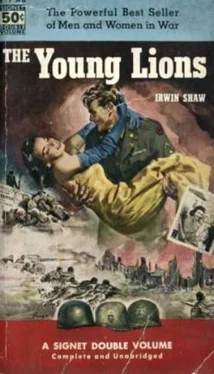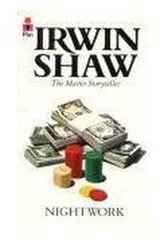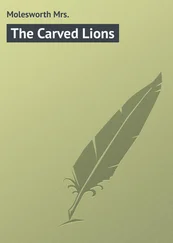Irwin Shaw - The Young Lions
Здесь есть возможность читать онлайн «Irwin Shaw - The Young Lions» весь текст электронной книги совершенно бесплатно (целиком полную версию без сокращений). В некоторых случаях можно слушать аудио, скачать через торрент в формате fb2 и присутствует краткое содержание. Жанр: Классическая проза, на английском языке. Описание произведения, (предисловие) а так же отзывы посетителей доступны на портале библиотеки ЛибКат.
- Название:The Young Lions
- Автор:
- Жанр:
- Год:неизвестен
- ISBN:нет данных
- Рейтинг книги:4 / 5. Голосов: 1
-
Избранное:Добавить в избранное
- Отзывы:
-
Ваша оценка:
- 80
- 1
- 2
- 3
- 4
- 5
The Young Lions: краткое содержание, описание и аннотация
Предлагаем к чтению аннотацию, описание, краткое содержание или предисловие (зависит от того, что написал сам автор книги «The Young Lions»). Если вы не нашли необходимую информацию о книге — напишите в комментариях, мы постараемся отыскать её.
The Young Lions — читать онлайн бесплатно полную книгу (весь текст) целиком
Ниже представлен текст книги, разбитый по страницам. Система сохранения места последней прочитанной страницы, позволяет с удобством читать онлайн бесплатно книгу «The Young Lions», без необходимости каждый раз заново искать на чём Вы остановились. Поставьте закладку, и сможете в любой момент перейти на страницу, на которой закончили чтение.
Интервал:
Закладка:
"We're going to sit down here for a while," Michael said, "and wait."
"For what?" Keane demanded.
"For Colonel Pavone."
"What if he doesn't show up?" Keane persisted.
"Then we'll make another decision. This is a lucky day for me," Michael said crisply. "I bet I'm good for three decisions before sunset."
"I think we ought to say the hell with Pavone," said Keane, "and move right in on Paris. The BBC says…"
"I know what the BBC says," Michael said, "and I know what you say, and I say we're going to sit here and wait." He walked away from Keane and sat down on the grass, leaning against a low stone wall that ran alongside the stream. The two Armoured Division soldiers looked at him doubtfully, then went back into their foxhole, pulling the branches cautiously over their heads. Stellevato leaned his tommy-gun against the wall and lay down and went to sleep. He lay straight out, with his hands over his eyes. He looked dead.
Keane sat on a stone and took out a pad of paper and a pencil and began writing a letter to his wife. He sent his wife a detailed account of everything he did, including the most horrible descriptions of the dead and wounded. "I want her to see what the world is going through," he had said soberly. "If she understands what we are going through, it may improve her outlook on life."
Michael stared past the helmeted head of the man who, at this distance, was attempting to improve the outlook on life of his frigid wife 3,000 miles away. On the other side of Keane, the unscarred old walls of the town, and the shuttered, unbannered windows, held their enigmatic secret.
Michael closed his eyes. Someone ought to write me a letter, he thought, to make me understand what I am going through. The last month had been so crowded with experience, of such a wildly diversified kind, that he felt he would need years to sift it, classify it, search out its meaning. Somewhere, he felt, in the confusion of strafing and capturing and bumping in dusty convoys through the hot French summer, somewhere in the waving of hands and girls' kisses and sniping and burning, there was a significant and lasting meaning. Out of this month of jubilation, upheaval and death, a man, he felt, should have been able to emerge with a key, a key to wars and oppression, a key to unlock the meaning of Europe and America.
Ever since Pavone had so savagely put him in his place that night on sentry duty in Normandy, Michael had almost given up any hope of being useful in the war. Now, he felt, in lieu of that, I should at least understand it…
But nothing fell into generalities in his brain, he could not say "Americans are thus and so and therefore they are winning," or "It is the nature of the French to behave in this fashion," or "What is wrong with the Germans is this particular misconception…"
All the violence, all the shouting, ran together in his brain, in a turbulent, confused, many-threaded drama, a drama which endlessly revolved through his mind, kept him from sleeping, even in these days of heat and exhaustion, a drama which he never would get rid of, even at a time like this, when his life perhaps was silently being jeopardized in this quiet, grey, lifeless town on the road to Paris.
The soft noise of the water going by between its banks mingled with the soft, busy scratching of Keane's pencil. With his eyes closed, leaning against the stone wall, drowsy from all the lost hours of sleep, but not surrendering to sleep, Michael sifted through the furious events of the month just passed… The names… The names of the sunlit towns, like a paragraph out of Proust: Marigny, Coutances, St Jean le Thomas, Avranches, Pontorson, stretching away into the seaside summer in the magic country where Normandy and Brittany blended in a silvery green haze of pleasure and legend. What would the ailing Frenchman in the cork-lined room have said about his beloved Maritime Provinces during the bright and deadly August of 1944? What observations would he have made, in his shimmering, tidal sentences, about the changes in architecture the 105s and the dive-bombers had brought about in the fourteenth-century churches; what would have been his reaction to the dead horses in the ditches under the hawthorn bushes and the burned-out tanks with their curious smell of metal and flesh; what elegant, subtle and despairing things would M. de Charlus and Mme de Guermantes have had to say about the new travellers on the old roads past Mont St Michel?
"I have been walking for five days now," the young Middle-Western voice had said next to the jeep, "and I ain't fired a shot yet. But don't get me wrong, I ain't complaining. Hell, I'll walk them to death, if that's what they want…"
And the sour-faced ageing Captain in Chartres, leaning against the side of a Sherman tank across the square from the cathedral, saying, "I don't see what people've been raving all these years about this country for. Jesus Christ on the mountain, there ain't nothing here we can't make better in California…"
And the chocolate-coloured dwarf with a red fez dancing among the Engineers with minesweepers, at a crossroads, entertaining the waiting tankmen, who cheered him on and got him drunk with Calvados they had taken as gifts from the people along the road that morning.
And the two drunken old men, weaving down the shuttered street, with little bouquets of pansies and geraniums in their hands, who had given the bouquets to Pavone and Michael, and had saluted and welcomed the American Army to their village, although they would like to ask one question: Why it was, on July 4th, with not a single German in the town, the American Army had seen fit to come over and bomb the place to rubble in thirty minutes?
And the German Lieutenant in the First Division prisoner-of-war cage who, in exchange for a clean pair of socks, had pointed out on the map the exact location of his battery of 88s, to the Jewish refugee from Dresden who was now a Sergeant in the MPs.
And the grave French farmer who had worked all one morning weaving an enormous "Welcome USA" in roses in his hedge along the road to cheer the soldiers on their way; and the other farmers and their women who had covered a dead American along the road with banks of flowers from their gardens, roses, phlox, peonies, iris, making death on that summer morning seem for a moment gay and charming and touching as the infantry walked past, circling gently around the bright mound of blossoms.
And the thousands of German prisoners and the terrible feeling that you got from looking at their faces that there was nothing there to indicate that these were the people who had torn Europe from its roots, murdered thirty million people, burned populations in gas-ovens, hanged and crushed and tortured through 3,000 miles of agony. There was nothing in their faces but weariness and fear, and you knew, being honest with yourself, that if they were dressed in ODs, they would all look as though they came from Cincinnati.
And the funeral of the FFI man in that little town – what was its name? – near St Malo, with the artillery going off all around it, and the procession winding behind the black-plumed horses and the rickety hearse up the hill to the cemetery, and all the people of the town in their best clothes, shuffling along in the dust, to shake the hands of the murdered man's relatives who stood at the gate in a solemn line. And the young priest, who had helped officiate at the funeral services in the church, who answered, when Michael asked him who the dead man was, "I don't know, my friend. I'm from another town."
And the fifteen-year-old boy in Cherbourg who had been furious with the Americans. "They are fools," he had said hotly.
"They take up with exactly the same girls who lived with the Germans! Democrats! Pah! I give you democrats like that! I, myself," the boy boasted, "have shaved the hair off five girls in this neighbourhood for being German whores. And I did it when it was dangerous, long before the invasion. And I'll do it again, oh, yes, I'll do it again…"
Читать дальшеИнтервал:
Закладка:
Похожие книги на «The Young Lions»
Представляем Вашему вниманию похожие книги на «The Young Lions» списком для выбора. Мы отобрали схожую по названию и смыслу литературу в надежде предоставить читателям больше вариантов отыскать новые, интересные, ещё непрочитанные произведения.
Обсуждение, отзывы о книге «The Young Lions» и просто собственные мнения читателей. Оставьте ваши комментарии, напишите, что Вы думаете о произведении, его смысле или главных героях. Укажите что конкретно понравилось, а что нет, и почему Вы так считаете.











